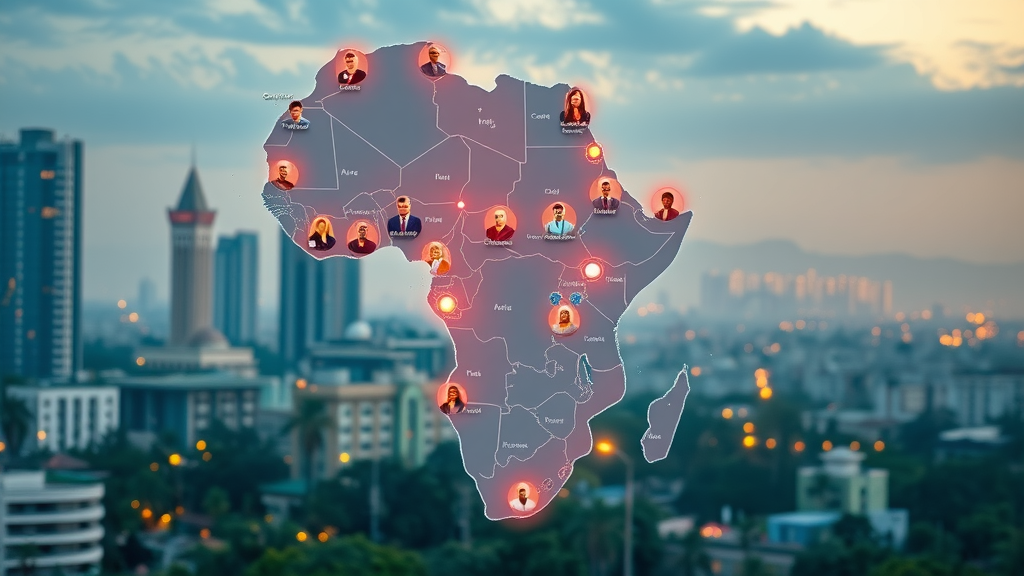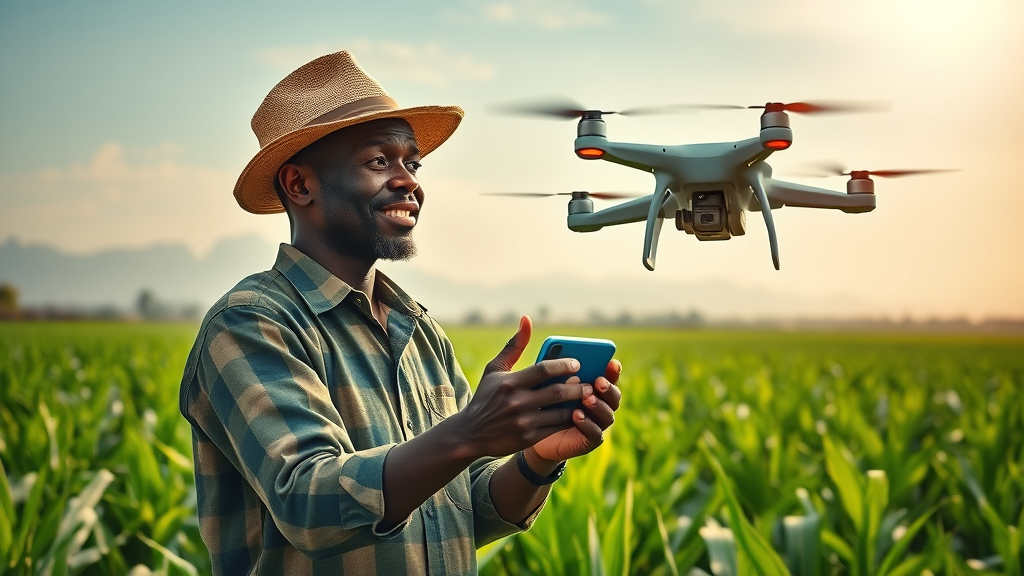Did you know? By 2025, Africa could infuse $1.2 trillion into its economy by embracing artificial intelligence innovations. This isn’t some far-off tech fantasy—the African AI ecosystem is rapidly becoming the beating heart of AI development, ingenuity, and transformation in the Global South. From bustling metropolises to rural communities, the continent is proving that resourcefulness and ambition outpace boundaries. If you want a front-row seat to the next giant leap in technology, Africa’s AI revolution matters more than ever.
Why the African AI Ecosystem Is the Next Frontier for Innovation
The African AI ecosystem is earning its title as the next big frontier for digital and economic growth—and for good reason. Unlike other regions with mature but saturated markets, Africa’s blend of youthful population , growing connectivity, and unique local challenges fuels an urgent appetite for innovation. Startups, government agencies, and grassroots coders across the continent are driving AI adoption faster than most anticipated, deploying tailor-made AI tools that directly address real-world problems. From smart farming solutions tackling food security to context-specific language models breaking down linguistic barriers, the African approach isn’t merely imitating existing ai strategies —it’s pioneering them.
Africa’s journey is fueled by a mobile technology explosion, the world’s youngest tech workforce, and bold investments in digital infrastructure. These forces combine to make the environment ripe for scalable AI solutions . As national AI strategies crystallize, it’s no surprise that foreign investors and research giants are turning their attention southwards. For anyone passionate about AI development that is inclusive and impactful, the African AI ecosystem is where the future is being written today.

A Surprising Surge: Rapid AI Adoption Across African Countries
Over the last decade, AI adoption has seen an astonishing surge across both established and emerging African economies. Countries such as Nigeria, Kenya, South Africa, and Rwanda have witnessed a wave of homegrown african AI startups leveraging affordable computational resources and open-source AI technologies like deep learning. Meanwhile, collaborative networks such as Deep Learning Indaba and the African Union’s pan-continental initiatives have united local talent, facilitating cross-border learning and scaling up AI systems targeted at Africa’s realities.
Technology festivals and accelerator programs across the continent buzz with energy, as aspiring AI professionals pitch ideas that sometimes defy global conventions: from disease diagnostics on low-end smartphones to micro-lending using voice-based AI tools in indigenous languages. These innovations are not just addressing market gaps—they are increasing Africa’s standing as a creator of original, relevant, and globally recognized artificial intelligence solutions.
Bridging Gaps: The Role of the African AI Ecosystem in Solving Unique Continental Challenges
What sets the African AI ecosystem apart isn’t just what it builds, but why . While Western AI often addresses convenience, in Africa, AI is a survival tool for communities faced with daunting challenges—like food insecurity, disparate healthcare resources, and fragmented educational systems. Local AI innovators are keenly aware of how context-specific solutions can bridge deep-rooted gaps. For example, AI-driven weather forecasting enables farmers to make smarter decisions, and language models are tailored to support dozens of official and regional dialects.
The ecosystem’s impact reaches far beyond immediate tech circles. By drawing in public, private, and non-profit sector collaboration, Africa’s approach makes sure that even the hardest-to-reach communities benefit from AI adoption . In doing so, the continent showcases a rare balance of technological ingenuity and social responsibility, positioning itself as a model for sustainable AI development on a global scale.
“By 2025, Africa is projected to add $1.2 trillion to its economy by leveraging artificial intelligence innovations.” – World Economic Forum
- Mobile technology penetration
- Youthful, tech-savvy population
- Growing investment in digital infrastructure
Navigating the African AI Ecosystem: Opportunities and Challenges
As thrilling as the progress appears, engaging with the African AI ecosystem means navigating a path rich in opportunity but also riddled with hurdles. Diverse ai strategies have blossomed from nations with vastly different infrastructure, political will, and investment climates. The region is grappling with a mix of untapped markets, remarkable AI research, and the sobering reality of persistent funding gaps and regulatory uncertainty. For every promising stride—from a national AI strategy to a regional research lab—there’s a call for more robust frameworks and sustainable capacity building efforts.
For policymakers, investors, and innovators, the message is clear: progress in the African AI space will hinge on deliberate collaboration, knowledge sharing, and long-term commitment to inclusive ai governance . While there’s consensus that AI can transform public services and economies, only dedicated action can ensure its benefits span all sectors and regions.
Emerging AI Strategies Shaping African Countries
Many African nations are now formalizing frameworks to fast-track AI-driven innovation for their citizens. Rwanda’s Centre for the Fourth Industrial Revolution stands out as a continental hub for inclusive ai policy and experimentation. Nigeria, home to a burgeoning startup ecosystem, recently launched its National AI Policy prioritizing sectors like agriculture, education, and fintech—the backbone of the region’s digital transformation. South Africa, meanwhile, continues investing in ai research and capacity building, establishing a National AI research agenda that feeds into its data science capabilities.
These ai strategies highlight the determination among African countries to control their digital futures. By integrating local languages, leveraging homegrown data, and promoting ethical AI development , each strategy reflects its country’s unique needs and aspirations—resulting in a tapestry of innovation with continental impact.

- Rwanda’s Centre for the Fourth Industrial Revolution
- Nigeria’s National AI Policy
- South Africa’s Artificial Intelligence Institute
Addressing Ethical Dilemmas: AI Governance in the African Context
AI governance in the African context must navigate a maze of ethical complexities—balancing rapid technological progress with societal protection and inclusion. Policymakers face high-stakes questions: How can AI-driven public service platforms avoid bias and respect privacy? Is enough being done to ensure AI systems benefit marginalized communities? Unlike some regions where regulatory debates lag behind innovation, African governments recognize these issues as urgent.
Collaborative forums, involving government, academia, and industry, are giving rise to context-specific frameworks for ai systems that align with Africa’s legal and cultural diversity. The goal is a continent-wide commitment to data governance that supports open AI research, protects human rights, and minimizes unintended harms, ensuring sustainable artificial intelligence growth.

Overcoming Barriers: Talent, Funding, and Regulatory Hurdles in the African AI Ecosystem
Building trustworthy and effective ai infrastructure demands more than just talented engineers. Africa contends with funding shortfalls, a shortage of advanced training programs, and inconsistent regulatory climates. While leading economies like South Africa and Nigeria have invested in local AI hubs and cross-border innovation networks, smaller nations often lack the funding and enabling environments needed for broad-based ai research .
Despite these obstacles, partnership initiatives with global AI leaders, locally led research labs, and targeted government grants are reshaping the talent landscape. With the right balance of regulatory oversight and access to resources, the African AI ecosystem stands to overcome its most pressing barriers in the years ahead.
| Country | Core Focus of AI Strategy | Year Initiated | Notable Achievements |
|---|---|---|---|
| Rwanda | e-Government, healthcare AI | 2019 | AI-powered health platforms |
| Nigeria | Education, agriculture, fintech | 2021 | AI startup incubators |
| South Africa | Data science capacity | 2020 | National AI research agenda |
Artificial Intelligence: Transforming African Industries and Societies
The pan-continental impact of ai innovation is nowhere more visible than in Africa’s core industries. Fueled by context-aware ai strategies and local ingenuity, sectors like agriculture, healthcare, fintech, and education are morphing before our eyes. The result is a new paradigm where AI solutions not only drive efficiency but also expand opportunity for millions of Africans—redefining what’s possible with limited resources, and propelling African countries into an era of digitally powered growth.
Artificial intelligence is now embedded in products and services that touch everyday life, whether it’s credit-scoring for nano-businesses, diagnosing malaria with smartphone apps, or creating dynamic curricula that bridge learning gaps in public schools. This is tangible, far-reaching impact by and for the people of the continent.
Case Study: AI in African Agriculture—Boosting Food Security
Agriculture is the backbone of many African economies—so it comes as no surprise that AI tools are making dramatic inroads in this sector. Imagine a young farmer in Ghana operating drone-powered crop surveillance or a community in Kenya using satellite data and machine learning to optimize irrigation and predict drought cycles. These are no longer science fiction; local AI companies and international partnerships are rolling out platforms that provide smallholder farmers with actionable, real-time insights.
The result? Increased yields, lower input costs, and a more resilient food supply—all while empowering a new generation of agri-entrepreneurs. By addressing real challenges on the ground, the African AI ecosystem ensures that technological progress is inseparable from food security, sustainable agriculture, and rural prosperity.

Reimagining Healthcare: AI-Driven Medical Innovation in African Countries
Healthcare in Africa faces chronic shortages: of specialists, equipment, and funding. Yet, artificial intelligence is rewriting this narrative. Across Nigeria, Rwanda, and Ethiopia, AI-driven telemedicine platforms diagnose diseases from simple smartphone photos. Public clinics deploy chatbots to triage patients, reducing wait times and helping overstretched nurses provide personalized care.
What makes these AI systems powerful is their accessibility—they’re built for solar-powered clinics, for local languages, for the continent’s realities. From shifting early screening for chronic illnesses to enabling data-driven decision-making in overburdened hospitals, AI is driving a quiet but profound revolution in African health systems.

Financial Inclusion: How the African AI Ecosystem Fuels Fintech Solutions
Fintech is one of the brightest stars in the African innovation constellation, largely because of contextual AI adoption . Millions who were once excluded from traditional banking are joining the financial mainstream through AI-powered mobile lending, credit scoring algorithms, fraud detection, and micro-investment platforms. Many of these platforms are created by homegrown engineers who understand local constraints like unreliable connectivity, low literacy, and high currency volatility.
As a result, financial inclusion in Africa has moved from being a policy dream to an entrepreneurial reality, closing inequality gaps and turning the African AI ecosystem into a launchpad for global fintech disruptors. These examples prove that artificial intelligence is not just a technology, but a catalyst for economic transformation and opportunity.
"African AI innovators are leapfrogging traditional barriers by building context-specific solutions that challenge global conventions."
Education Revolution: Leveraging Artificial Intelligence to Bridge Learning Gaps
With the world’s fastest-growing school-age population, Africa’s education crisis is acute—and AI solutions are at the forefront of efforts to bridge these learning divides. AI-powered platforms now deliver personalized learning, translation into local dialects, and even real-time analytics for teachers in under-resourced schools. Whether in urban STEM academies or remote rural classrooms, artificial intelligence is making education more inclusive, efficient, and adaptive to individual student needs.
These initiatives are placed alongside public and private investment in capacity building, with international collaborations—like Google’s investment in AI research labs and local coding bootcamps—widening access. As digital literacy spreads, the next generation of African students is being equipped not just to absorb knowledge, but to co-create the future of the global AI community .

AI Governance: Balancing Progress With Responsibility in the African AI Ecosystem
The potential of the African AI ecosystem comes with significant responsibility. As radical as the technological advances are, the foundation for long-term impact will depend on inclusive, transparent, and agile ai governance . African policymakers are already surfacing as thought leaders, asking how AI can be not just efficient but equitable; not just innovative, but values-driven—especially in societies marked by vast diversity and rapid change.
From national data protection laws to cross-continental conversations about digital rights, the continent is moving beyond regulatory catch-up into leadership in responsible AI development .
Inclusive AI Strategies: Addressing Gender, Language, and Geopolitical Diversity
What makes the African AI ecosystem uniquely resilient and relevant? It’s the focus on inclusion—of women, minority groups, and the full spectrum of Africa’s 2,000+ languages and dialects. Technology platforms are increasingly being designed to ensure accessibility and representation. AI-driven voice assistants may interpret and reply in local languages, while data sets are curated to reflect Africa’s gender, age, and rural-urban diversity.
Collective efforts, such as the African Union’s push for shared ethical frameworks, ensure that marginalized voices aren’t lost in developer boardrooms or machine learning data. The result is an AI-driven future that reflects Africa’s intricate social fabric and geopolitical realities.

Strengthening AI Regulation: Collaboration Across African Countries
No single nation can tackle the challenges or seize the opportunities of artificial intelligence in isolation. Through organizations like the African Union, countries are building regulatory harmonization and sharing best practices. These region-wide collaborations are helping set norms for AI safety, fairness, and accountability while opening the door for collective bargaining in global tech partnerships.
Whether it’s joint investment in AI research labs, regional data governance projects, or continent-wide policy guidelines, Africa’s collaborative approach to AI regulation is fast becoming a model for the rest of the world.
What You Need to Know About the African AI Ecosystem's Global Impact
The ripple effects of the African AI ecosystem are now visible on the global stage. Once considered a technology consumer, the continent is emerging as an innovation powerhouse—shaping global AI discourse, attracting international investments, and exporting AI talent and solutions to the rest of the world. Africa’s unique blend of ingenuity, necessity, and community-driven development is rewriting long-held assumptions about where the future of AI will be decided.
For investors, researchers, and companies worldwide, understanding Africa’s AI momentum is no longer optional. It’s essential.
Competing on the World Stage: International Partnerships and Investments
Africa’s appetite for AI collaboration has sparked a surge of global partnerships. Major platforms like Google, IBM, and Microsoft are investing in local AI research hubs, while academic exchanges and startup incubators bring African innovators into the international fold. These ventures aren't just transferring technology; they're creating new ecosystems where African expertise shapes global AI best practices.
Foreign direct investment is following the innovators, targeting local AI startups and research labs in Nairobi, Lagos, and Cape Town. With the African AI ecosystem inviting global players to co-create, international influence is now a two-way street—making Africa a contender, not just a contributor, on the world stage.
"The African AI ecosystem isn’t just keeping pace; it’s setting new rules for global artificial intelligence."
Talent Export: African AI Experts and Their Worldwide Influence
Africa’s AI revolution isn’t only homegrown—it’s global. Driven by world-class bootcamps, university programs, and regional research competitions like the Deep Learning Indaba , African AI experts are increasingly sought-after worldwide. Graduates from these programs now lead major projects at top tech firms, contribute to open-source deep learning initiatives, and shape AI policy frameworks internationally.
This “talent export” signals a reversal of past brain drain patterns. Today, many leading AI practitioners choose to return home, mentor local teams, or launch continental AI startups, adding value not only in Silicon Valley or London but in Accra, Tunis, and Johannesburg. The world is taking notice: African AI talent is redefining what it means to lead in the age of artificial intelligence.
Frequently Asked Questions About the African AI Ecosystem
- What are the leading AI strategies adopted by African countries? African countries are rolling out bespoke national AI strategies focused on sectors like healthcare, agriculture, fintech, and education. Rwanda has pioneered AI in government services, Nigeria invests in startup incubators, and South Africa excells in data science research—all pushing for context-specific, ethical, and inclusive AI adoption.
- How does AI governance in Africa differ from other regions? Africa’s AI governance stands out for its focus on local relevance, inclusion, and community engagement—often integrating regional diversity in language and culture. Rather than top-down regulation, the continent emphasizes partnership between governments, academia, business, and civil society to create agile and participatory policy frameworks.
- What are the major challenges facing the African AI ecosystem? Key hurdles include limited access to advanced training, inconsistent data governance, modest funding and infrastructure, and regulatory uncertainty. Yet, these are countered by resilient local talent, innovative business models, and a spirit of cross-border collaboration.
- Which sectors are benefiting most from artificial intelligence in Africa? Agriculture, healthcare, fintech, and education are currently leading in AI-driven transformation—empowering small farmers, expanding health access, fostering financial inclusion, and bridging learning gaps for millions. Other sectors like logistics, energy, and public administration are rapidly catching up.
Key Lessons: The African AI Ecosystem’s Surging Momentum
- Innovation is thriving in Africa’s AI ecosystem despite limited resources.
- Collaborative AI strategies are closing societal gaps.
- Thoughtful AI governance ensures sustainable development.
- Africa’s artificial intelligence is globally influential.
Taking Part in Africa’s AI Revolution: Insights for Innovators, Investors, and Policymakers
The African AI ecosystem is open to all: from local founders to global investors and government policymakers. If you want to shape the next chapter of technology, Africa’s diverse AI strategies offer an opportunity to drive both profit and progress. By supporting local incubators, advancing ethical AI, and championing cross-border frameworks, you can ensure your actions make a difference—both in Africa and around the world.

- Support and invest in local AI startups
- Prioritize inclusive and ethical AI development
- Advocate for cross-border AI governance frameworks
Explore the African AI Ecosystem—Get Involved, Stay Informed, and Champion Innovation
Join the conversation, champion local solutions, and follow Africa’s accelerating AI journey. Whether you’re an innovator, investor, or policymaker, the continent’s AI ecosystem offers lessons, inspiration, and opportunities that the rest of the world can’t afford to ignore.
To deepen your understanding of the African AI ecosystem, consider exploring the following resources:
-
“How AI is impacting policy processes and outcomes in Africa” : This article examines the rapid expansion of AI across the continent, highlighting initiatives like the African Institute for Mathematical Sciences (AIMS) and the establishment of AI research labs by major tech companies. It also discusses the role of grassroots communities in training the next generation of AI researchers. ( brookings.edu )
-
“Can AI help Africa close the development gap?” : This piece explores how AI is being leveraged to address challenges in various sectors across Africa, such as improving medical diagnostics, aiding farmers, and providing tailored education. It also discusses the hurdles, including infrastructural gaps and the need for localized language support, and emphasizes the importance of regionally tailored and led AI initiatives. ( ft.com )
These resources offer valuable insights into the transformative role of AI in Africa and the collaborative efforts driving its growth.
 Add Row
Add Row  Add
Add 




Write A Comment